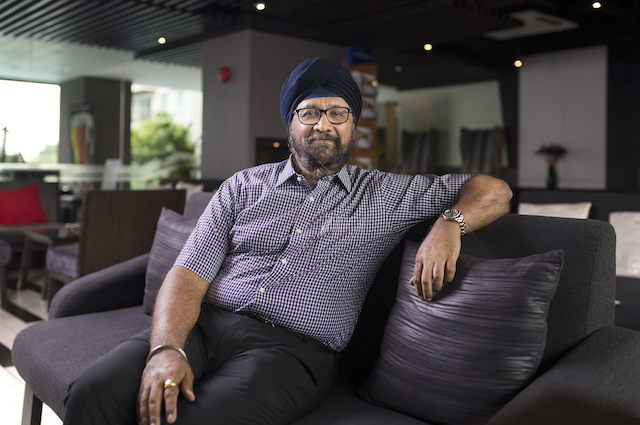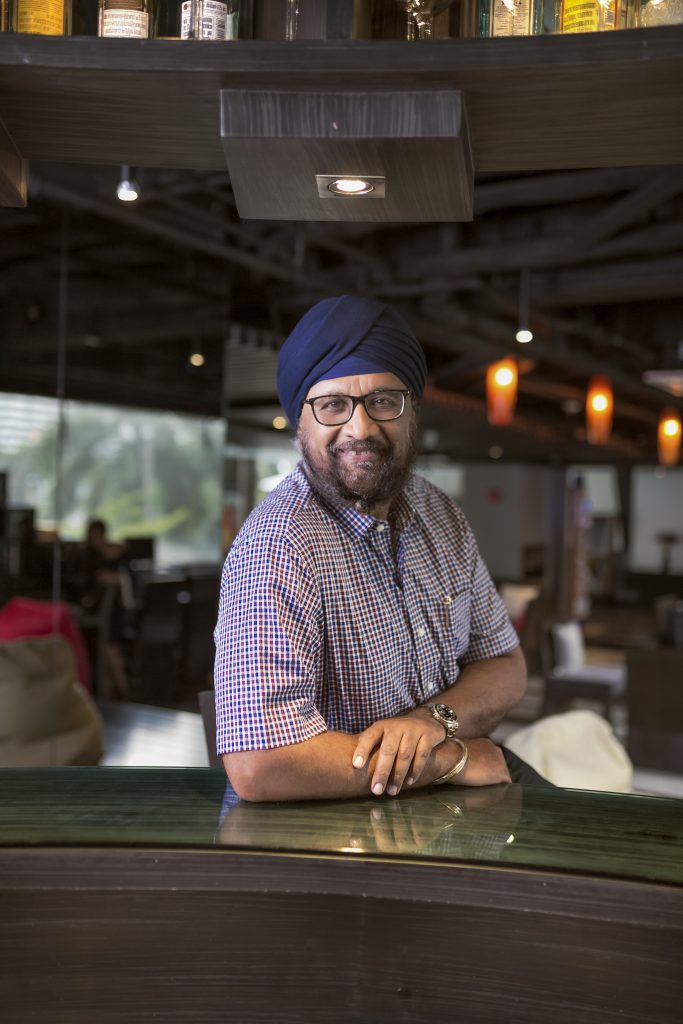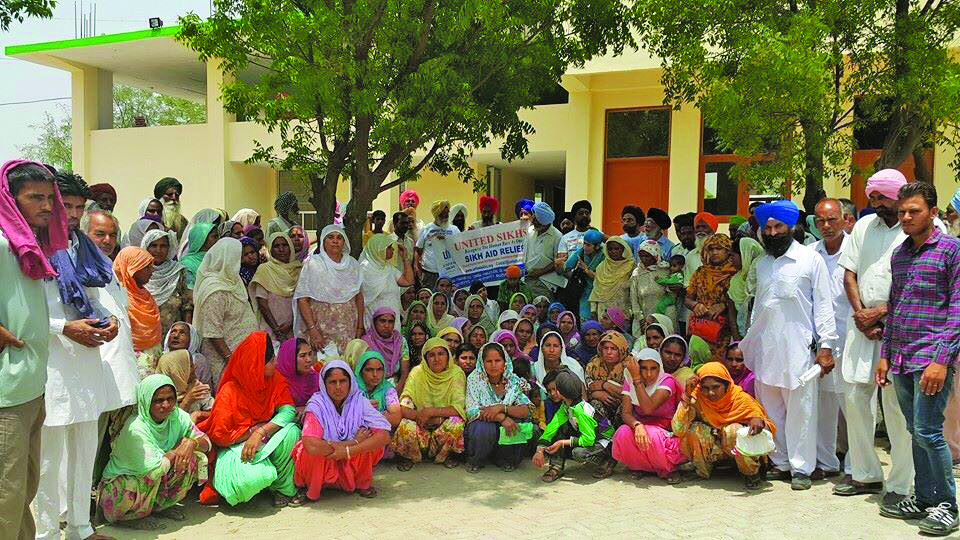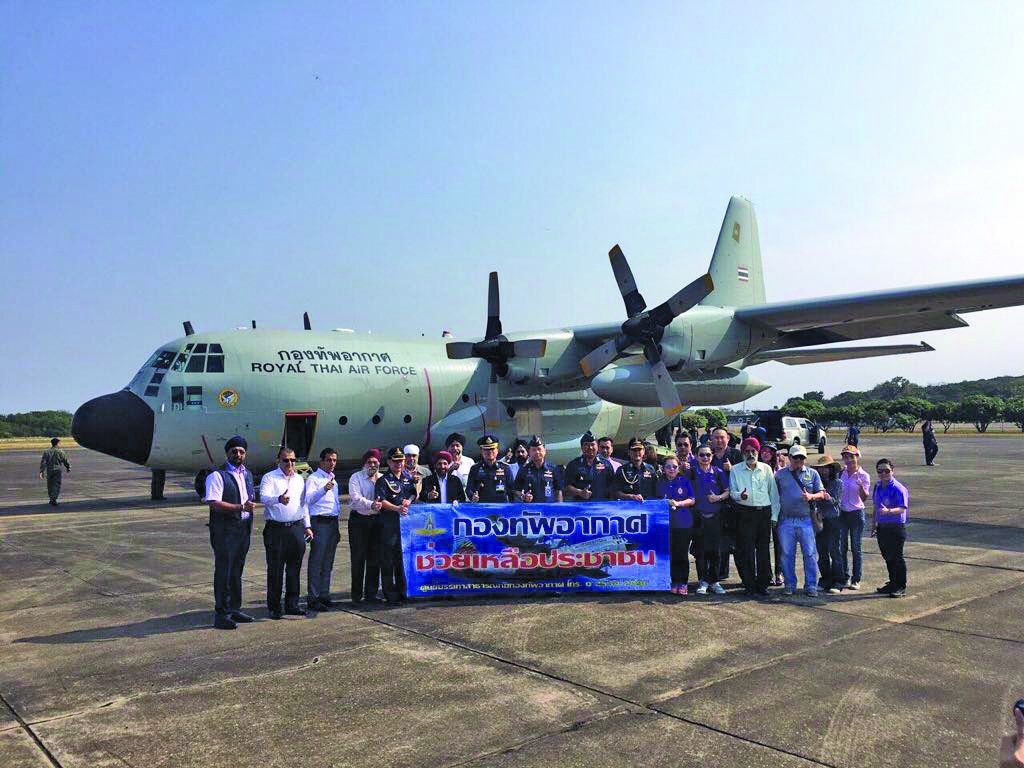Pinderpal Madan is an experienced businessman with a heart of gold.
By Christy Lau
It is not every day you meet an executive who is so driven by the need to help those less fortunate. But for Pinderpal Madan, Managing Director of Thai Japan Group, giving back is not just smart business, it is a civic duty.
Primarily dealing in the textile trade, this family-run business has expanded in the past decade to include a few other subsidiaries under its main umbrella. There is now the manufacturing arm K.S. Perfection Industries, and a real estate portfolio which manages a few Golden Tulip Hotels under the Mandison label.
As someone who takes his role very seriously, Pinderpal has been the principal force in his company’s current success story. But just like the selection of quality fabrics you’ll find on the company’s portfolio, this MD’s approach to business is richly embroidered with a beautiful pattern of generosity
and goodwill.
The company website’s corporate social responsibility section is filled with numerous projects he has initiated and been a part of. These include donating to The Kidney Foundation of Thailand, building schools for underprivileged children, and providing non-perishable goods like rice and wheat flour to the Christian asylum seekers and others who are severely in need.
These are causes he feels strongly about and are woven through the cloth of the company’s DNA. Having been in business for more than a few decades, Pinderpal shares some of the lessons he has learnt that got him to where he is today, and why he believes in giving back and changing the world for the better.
Tell us what inspired you to get into the textile business, and how the Thai Japan Group has grown over the years?
Getting into the textile business was natural, as my father had set up Thai Japan Textiles Co., Ltd in 1970. The initial focus was trade of textiles for the local market, and when I joined, I set up our export department, which is currently our core business, and it steadily grew to approximately five times the sales of our local business. After growth was steady and my brother Karamjit Madan was heading that division, we developed our manufacturing subsidiary, KS Perfection Industries, which produces intricate embroidery and lace fabrics.
Our textile trade saw a double-digit growth rate until around 2003, when Thailand’s textile industry reached maturity. Cost disadvantages were seen industry wide, and we no longer achieved our desired growth. That’s when we decided to focus on the booming tourism industry, and expanded and diversified our real estate portfolio. Today, we have three hotels under the chain of Golden Tulip, and a serviced apartment, which are all managed and run by us, under the Mandison label.
What are some challenges you’ve had to endure to reach the success you have today?
Starting from scratch meant we began our textile business with no banking facilities. Over time, we built a good relationship and trust system with our initial financers. That helped tremendously to drive our growth in that first chapter. Also, when I began, we could not afford to hire a large team, so we were doing everything ourselves — from accounting and sales to documentation and dealing with suppliers. There were times I was personally packing goods myself in our apartment to make sure we did not miss any deadlines. You must be prepared to get your hands dirty.
I understand your company is a family run business. What are some of the advantages and disadvantages of working with family?
A great advantage is you have their undying support and loyalty in times of crisis, and it is in these crises that everyone’s true nature comes out. In times like this, your bond grows deeper, which will help your relationship both personally and professionally. A disadvantage, perhaps, is that you really have to understand that everyone’s skills are not the same — and you must be careful not to compare one child or colleague to another. Instead, you identify their talent and potential, and make sure they are placed in correct positions of the company, where they will develop and grow in their own way. My motto is to never leave anyone behind.
My personal philosophy is that the head of the company must take care of the resources that are passed on from generation to generation, and a path of growth must be instilled into the family’s thought process.
What are some of the business philosophies you live by?
1. Focus and dedication: you must be willing to give 100 percent of your time to your business.
2. Sacrifice: Your social life definitely has to take a step back when necessary.
3. Treat your business partners well: Everyone needs margins, including your suppliers and customers. Your clients must also profit, and if they don’t, you won’t get their returning business. They are not vehicles to make money from but your partners. You must be able to grow together.
What do you enjoy most about what you do?
I love seeing my family work hard with commitment. I have my brother and three children currently working, and soon my brother’s children will join as well. Seeing them grow and flourish makes me happy. It is not all about amassing wealth, but rather it is about learning from mistakes and being happy with our accomplishments, however big or small.
What is a typical workday like for you?
I manage our businesses holistically, so in a day I move from our head office in Issaraphap, to our factory in Samut Sakhon, to our hotels and properties in Bangkok and Pattaya, and also our retail outlets. Every day is different!
Both the textile and hospitality industry are very fast-moving and competitive. How do you keep things fresh and exciting?
A lot of research and discussion is necessary. Our family members who are active in the business aim to meet every two months to discuss the future; which products and industries we should focus on more; and how to grow further. We all come together with different viewpoints and experiences, which keep things interesting.
What keeps you motivated every day?
Definitely seeing our new generation work with more vigor and determination, which keeps me motivated to continue working as I grow older.
Additionally, I believe that we have a duty to help society. If we enjoy growth in our businesses and we have the means to help others, we must. This motivates me to continue working and to do my duty as part of our community and nation.
In what way does your company give back to the community?
Ideally, I believe that 10 percent of earnings should go to altruistic causes. We are very blessed to be where we are, but the country we live in still has pockets of need, hence we should identify and give back to these communities.
Our family works with various charitable organisations to build schools in Thailand and give scholarships to students annually. We also continuously work with global charities
that give back to communities in India and the Middle East. Our focus for the next few years will be for communities in the Indian subcontinent.
How did you decide on which charities to support?
It was based on the people who were working for these committees; whether they were selfless and not drawing any personal benefit from their work. They had to be willing to give the time without expecting anything in return.
In your opinion, where do you see the future of textiles heading?
It will hop around from market to market. In the 1950s and 1960s, Japan was the face of textiles. It then shifted to Korea and Taiwan, and then Thailand and China. Now, it is India and Bangladesh, as production facilities, costs and advantages are all changing. You cannot chase the industry; you must adapt yourself to each change that comes and look for advantageous markets. For Thailand, tourism is now thriving, so that has been our recent focus.
How have you managed to stay humble when you have attained so much success?
It is important to remind ourselves that material wealth is not permanent, so that we don’t become driven by our egos. The realisation that wealth and health are not enduring certainly helps keep one humble.
Personally, what do you feel has been the biggest key to your success today?
My belief is that my father, Kuldip Singh Madan, has built our family to where it is today. When I started out, it was his reputation and unshakable commitment that opened doors for me wherever I sought to do business. Today, at age 88, he is still our mentor and guide, and we are very blessed to have him. I sincerely hope that the next generation of entrepreneurs understands that a reputation of sincerity and honesty will always draw opportunities to them.
Many people take their parents or mentors for granted, but it’s very important to look back and appreciate what they’ve done for you.
You have already expanded and have a global presence in several countries across the world. What is next for Thai Japan Group?
We are currently focusing on real estate now with several projects in the strategic planning stage, including one upcoming resort in Phuket, but we are constantly looking for new business opportunities beyond the industries we have a foothold in. The possibilities are limitless!
Finally, what advice can you offer young men and women who are just starting their own business?
You have to be innovative in what you offer, because the market is flooded with different products and services, and sometimes people themselves don’t realise what they need until they physically see it in front of them.
Additionally, when you work in an organisation, as a leader, you have to think for the well-being of your collective team, not just for yourself. When you are doing that, you are also motivating them, and then the possibilities and opportunities you can achieve together are limitless.
Another important lesson is to earn diligently when you first begin your business — don’t overspend. Our markets are replete with various credit facilities, and it is very easy for people to spend money they do not actually have. This becomes a cycle and it will only hinder you.
Finally, don’t hate the competition. Healthy competition is what will keep you on your toes and push you to consistently improve your business model. In my viewpoint, competition is vital for innovation.









